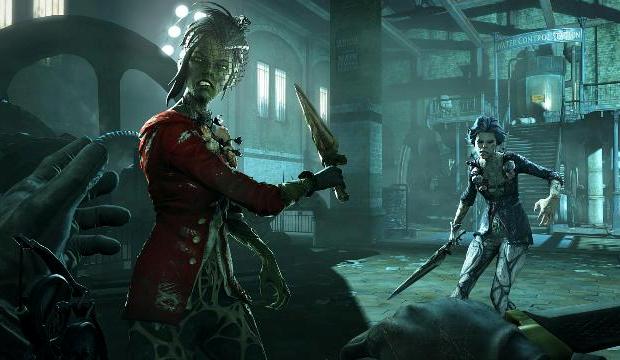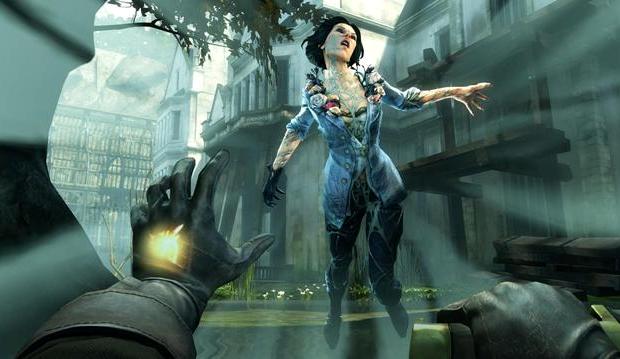Daud is a cold-hearted and dangerous man. As the person responsible for the murder of noble Empress Jessamine Kaldwin, the leader of The Whalers was depicted as a deplorable human being in Arkane Studios’ Dishonored. Of course, that was before players saw the plague-infested city of Dunwall through the eyes of the master assassin in The Knife of Dunwall.
Showing remorse for his previous actions, the dark antagonist-turned-protagonist is attempting to track down the head of the supernatural coven known as The Brigmore Witches, Delilah. With this being part two of Daud’s arc, anyone jumping into this final expansion for Dishonored will be fully aware of why he is trying to atone for his sins, and describing true motivations would be spoiling plot points in his initial playable outing. However, it can be said that Daud’s feeling of guilt is certainly more pointed here and makes the Michael Madsen-voiced character much more empathetic. The Brigmore Witches themselves, on the other hand, are the biggest addition – and yet leave very little impact.

These magical hags don’t make their true entrance until the final section of the game at a rundown Manor, equipped with a spooky crypt for effect. One of Dishonored’s overbearing issues has always been that it’s difficult to comprehend whether certain enemies have you in their sights or not. Come across a group of these nefarious sorceresses, and this problem is amplified, ten-fold. Utilising a power akin to Blinking, The Brigmore Witches can appear in your line of sight out of nowhere and, in turn, you’re then in theirs. With no need to set off an alarm, just like magic (appropriate, really), a throng of aesthetically vile adversaries descend on your locale and hit Daud with projectiles until death is an inevitability. Unless, of course, the quiet killer becomes the brash executioner.
The Brigmore Witches are subhuman, and their 21/20 vision, along with their crystal clear hearing, reduce the gameplay to pure chaos. That’s fine if that’s your preferred method of play, but Dishonored is all about choices and, sadly, they effectively leave the player with only two choices: kill or be killed. The inconsistency of The Witches is terribly frustrating to contend with and led me to more conflict than I had wished for. Even with Daud’s tendencies to play more combatively than the main campaign’s hero, these overpowered women of black magic make it difficult to play the game furtively.
Even with the annoyance of the enemies’ indeterminable behaviour, Brigmore Manor stands out as the most noteworthy environment in the added content. Across a swamp lies the massive, broken down home, is surrounded by lush foliage. A departure from the common, industrial-themed outside settings of Dishonored, the Manor’s Crypt and interior add a dingier tone to The Witches’ dwelling. Overall, The Brigmore Witches add-on takes players across a more diverse display of traversable venues.

The Knife of Dunwall introduced some new powers into Dishonored’s lore, the majority of which can only be utilised when players choose to be brutal over taking a non-lethal approach. It feels like Arkane are attempting to push you into unleashing your wrath upon the many gangs of Dunwall by making Daud’s abilities focus on drawing blood. A more vicious style isn’t mandatory, but is definitely hard to avoid at certain points, on top of the disarray at Brigmore Manor. In stark contrast with the number of new abilities bestowed on you in the previous add-on, only Pull is a new addition this time around. As the name suggests, you can grab items – or, when upgraded, enemies – and pull them closer in order to do with them as they wish. Corrupted Bone Charms are one of the more substantial enhancements to the established systems as these perks now have detrimental effects, as well as positive ones.
VERDICT: The Knife of Dunwall definitely wasn’t emphatic in setting the stage for The Brigmore Witches, but did offer something fresh. As part two, a drastic change wasn’t expected, but the few alterations essentially stunted Dunwall’s insistence on offering diverging paths and cluttered the city with unwanted mayhem. Many of the hallmarks seen in Dishonored are here and that includes exploratory options, but their rarity is both frustrating and disappointing. The Brigmore Witches is a mostly satisfactory end to one of 2012’s best-loved games, but it could have and should have concluded with more pizazz.
 GOOD. A game that scores 7/10 is worthy of note, but unworthy of fanfare. It does many things well, but only a few of them incredibly well and, despite a handful of good qualities, fresh ideas and solid mechanics, it fails to overwhelm.
GOOD. A game that scores 7/10 is worthy of note, but unworthy of fanfare. It does many things well, but only a few of them incredibly well and, despite a handful of good qualities, fresh ideas and solid mechanics, it fails to overwhelm.






